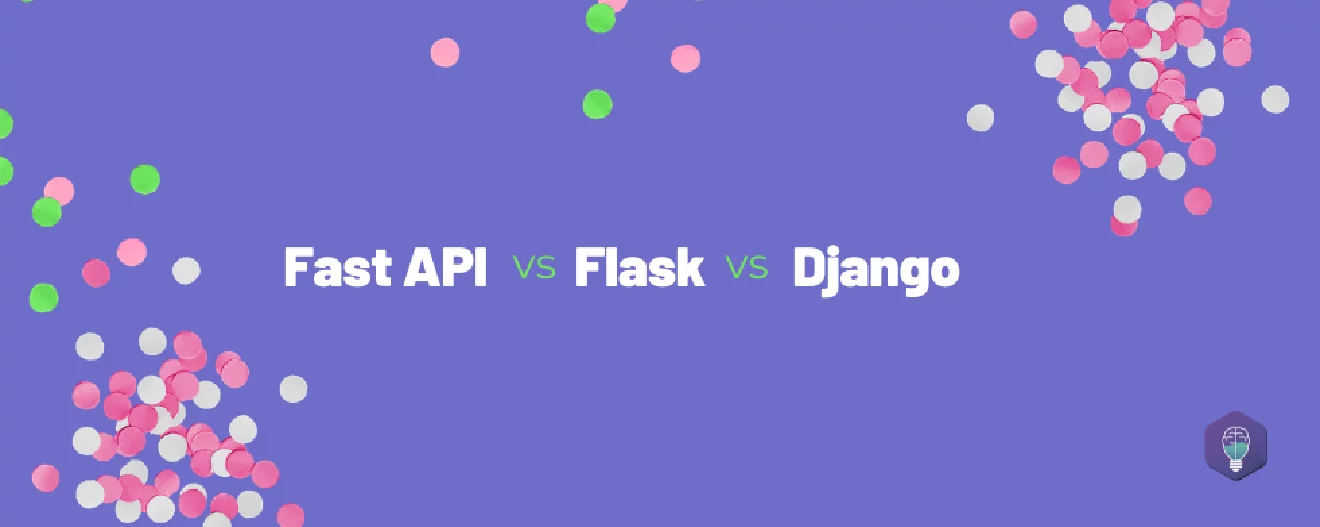Django
Fast API vs Flask vs Django

Though the names are different, these three frameworks FastAPI, Flask, and Django have a common similarity in that is they are web frameworks written using the Python language. These three frameworks have been used by developers for a variety of purposes. The three frameworks have distinct features that serve the best in development. Let us look at how these frameworks differ from each other in this article.
FastAPI
Fast API is a Python-based web framework that enables us to use the REST interface in development. It is a fast and high-performance framework to build APIs with the latest Python 3.6+, created by Sebastian Ramirez. Some of the popular features of the FastAPI include:
- Fast: As the name indicates, Fast API is the very fastest framework in Python with higher performance similar to NodeJS and GO.
- Faster Coding: Development speed has been increased from 200% to 300%
- Fewer Bugs: Human-made errors are reduced by 40%. Debugging time is less.
- Easy and Short: The framework is easy to use and it has less code duplication. So each parameter has multiple features and very few bugs.
- Robust: It provides automatic interactive documentation along with production-ready code.
- Standards: The framework is based on the OpenAPI and JSON Schema.
- Editor support: FastAPI is intuitive to use and the feature “Autocompletion” remains a favorite for all.
Pros:
- FastAPI offers validation of the developer’s data types and the deeply nested JSON requests.
- FastAPI has been developed using standards such as OAuth 2.0, JSON Schema, and OpenAPI.
- Building GraphQLAPI with graphene-python, a python library is easy using FastAPI.
Cons:
- It has a small community and lesser educational resources, as it newly emerges.
Read our article on – Python Basics: Data types
Flask
Flask is a Python-based micro web framework for developing web applications. It was created by Armin Ronacher. Since it is a microframework, it doesn’t have particular tools, libraries, or ORM (Object Relational Manager). Flask is a WSGI (webServer Gateway Interface) web application framework and doesn’t have features like template engine, routing, and more. The framework is based on WSGI and the Jinja2 template engine. Some of the notable features of flask include:
- Pythonic: Flask is entirely based on Python and very easy to get started with.
- Simple: Since Flask is a micro-framework, it is very simple and also extensible.
- Updated: Flask is a modern framework and its features are up-to-date.
- Readability: The framework is very explicit and it has better readability.
- Less complexity: You can save your program on multiple files, reducing the complexity.
Pros:
- Flask is more comfortable and flexible for the developers to use.
- Unit testing is possible with Flask. It enables you to tweak extensions and transit to a web framework.
- Flask is very simple and beginner-friendly.
- It lets you create apps faster and with minimal effort.
Cons:
- Security is a concern here as it uses modules that cause third-party involvement.
- Flask has a single source and multiple requests take time as it processes them one after the other.
Django
Django is also a python based web framework that uses the MTV (Model Template View) architectural pattern. It is an open-source framework developed by Adrian Holovaty and Simon Willison in 2005. The top features of Django include:
- Well documented: It is a well-established framework for the developers as it provides excellent documentation.
- Python-based: Since it is python based, Django is simple and easy to use.
- SEO Optimized: Django helps in maintaining the website through URLs which makes it efficient and easy for SEO engineers.
- Scalability: The level of implementation using Django is high. It helps in creating applications with greater precision and error-free.
- Security: Django provides security with expertise level of code.
Pros:
- The code structure of Django is efficient and using this, it is very easy to infuse more functionalities into the websites for the developers.
- Django is more flexible as it uses the Rest framework called Django Rest Framework (DRF).
- With Django, it is easy to build web APIs since it has a customizable and modular architecture.
- Django ensures security by protecting against joint SQL injection and forgery attacks from cross-site requests.
Cons:
- With Django, the speed is limited because of more reusable modules.
Read our article on – Python Basics: Functions and Variable Scopes
We have seen the three frameworks separately and let’s compare them with each other now.
Features
- FastAPI
- Packages – Minimalistic framework that doesn’t have reusability enabling packages.
- Community – Has small community
- Performance – High performant and faster
- Job Openings – Fewer opportunities
- Education – Easiest to learn but has very few online resources
- Flask
- Packages – Minimalistic framework that doesn’t have reusability enabling packages.
- Community – Has a moderate, thriving community
- Performance – Moderate in speed
- Job Openings – Moderate
- Education – Easy to learn and has many online materials.
- Django
- Packages – Full-stack web development framework that has reusability enabling packages.
- Community – Has the most significant community.
- Performance – Not so fast
- Job Openings – More opportunities for job
- Education – Learning Django is a bit harder but has many online resources available.
Conclusion
All three frameworks are effective for developing web applications as all the three are python based web frameworks. However, choosing the right one for you is in your hand. If you are looking to develop a full-stack website with high performance and functionalities, you can opt for Django. If you are aiming on developing a prototype for a web application and APIs or someone interested in machine learning, then Flask is ideal for you. FastAPI is suitable for someone who wants to focus on speed and scalability. Otherwise, all the three are good and suit you according to your requirements.
“We transform your idea into reality, reach out to us to discuss it.
Or wanna join our cool team email us at [email protected] or see careers at Startxlabs.”

Ready to start with us ?